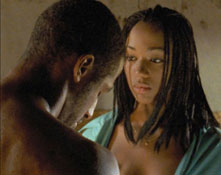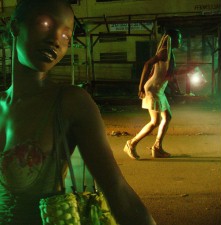Even though the festival african screens – new cinemas from africa at the House of World Cultures (HKW Berlin) started already last week I want to point towards it as a very good opportunity to get a sense of the african cinemas. So far I only have been able to visit two events, thus there will be not so much commenting as just a quoting from the program. Please explore yourself – from what I got to see so far, it is very rewarding to make the effort and get some real unpredictable impressions, which might change your, mine and anybodys limited understanding of these very lifely developing scenes….
| Chinua Achebe’s and Wole Soyinka’s books from the 1960s described the hopes associated with decolonisation and independence. Nowadays, it is Africa’s film-makers who dealing with post-colonial power relations and peoples’ longings and desires. |  |
| One of the most fascinating things about the new African filmscape is the fact that Africans from every country on the continent now have their say and address cinema audiences across the globe. They choose global themes from the most diverse and sometimes very personal angles: such as the end of nationalist utopias in Africa and the overcoming of proverbial Afro-pessimism. |  |
| African Screens presents current developments and creative visions in contemporary African film. An entire series of competing and often contradictory film languages is waiting to be discovered. Critical positions, in particular, are hardly ever seen in Europe because they contradict the politically correct and monolithic definition of African cinema upheld by festivals and cultural institutions here. We can only access its rich cinematic vocabulary and wealth of creative and political ideas once we stop focussing entirely on the difference between African and western cinema, and look instead at the difference in the cinematic languages and political visions inside Africa itself. …
The 6 long weekends of African Screens Post Colonial Aesthetics |
|
